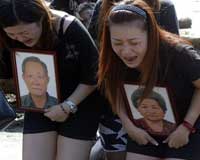| . |  |
. |
Taipei (AFP) Aug 16, 2009 Taiwan's leader saw last week how quickly a natural disaster can become a political one -- now he must win back political capital he lost during the bungled response to Typhoon Morakot, experts said. Bodyguards had to step in to protect President Ma Ying-jeou from the very people he had come to comfort as he visited survivors of the typhoon that may have left more than 500 dead across central and southern Taiwan. Dogged at every turn, Ma bowed to public anger by the weekend, apologising several times over the government's failure to see the magnitude of the crisis in time. "We could have done a better job and we could have done it faster. I am sorry that we did not do our job better and faster," Ma said while inspecting relief efforts in Nantou county on Saturday. "I will take full responsibility whatever the blame is. After all, I'm the president of this country," Ma told CNN on Sunday. He has a string of blunders to overcome: rejecting foreign aid, initially appearing arrogant and aloof when meeting survivors, and telling the British ITN television network that victims failed to take the initiative to evacuate. "Ma was elected on the slogan 'We are ready', but now the public sees his government doing a terrible job," Tung Chen-yuan, a political analyst at National Chengchi University said. "This could deal a significant blow to his popularity." Ma swept to power in a landslide victory in May last year. Since taking office, he has deftly managed the tightrope of Taiwan politics by boosting the economy with China-friendly policies while keeping opposition charges that he was compromising the island's sovereignty at bay. But until the typhoon, the former Taipei mayor and Harvard Law graduate had not been tested by crisis. In recurring scenes broadcast on Taiwanese media, angry survivors desperate for news of missing relatives confronted Ma as he visited devastated areas. "What is the government doing? It's too late, they cannot be saved," an angry man yelled at Ma during one of the visits. Late in the week he sought to regain control, on Friday calling his first-ever national security meeting and replacing his emergency response chief -- a move that reinforced some commentators' comparisons to the Bush administration's handling of Hurricane Katrina. "The government lacks organisation and efficiency and makes many mistakes... public anger is mounting and the confidence in the government is shaken," said George Tsai, a political science professor at Chinese Cultural University. But the emergency is far from over with helicopters still airlifting survivors to safety as troops battle raging rivers with collapsed bridges to reach victims, many of whom have been without food for more than a week. Even bigger challenges may lay ahead after the emergency stage, when Ma will have to plan and fund the reconstruction and will have the delicate task of deciding how to resettle the affected areas' indigenous tribes, Tung said. While Ma attempted to deflect criticism that his administration had been too proud to ask for outside help, a damaging foreign ministry memo leaked out telling the island's overseas missions to decline assistance. The ministry reversed the decision and has started accepting foreign aid, but defended the memo as a temporary order. Turning down international assistance seems absurd, commentator and retired ambassador Loh I-cheng said. "The whole government lacks a sense of responsibility and officials are shirking their jobs. Ma's biggest enemy is the government bureaucracy, not Chen Shui-bian or the Democratic Progressive Party (DPP)," Loh said, referring to Taiwan's former president and Ma's former rival. Despite the typhoon setbacks, voters may still support Ma's Kuomintang party over the opposition DPP, which has been hobbled by a string of corruption scandals implicating Chen and other top officials, some analysts said. But unless Ma's handling of the typhoon's aftermath improves quickly, his party will suffer in year-end regional elections and possibly hurt his re-election in 2012. "As public opinion grows more hostile, it seems that he's going to pay a heavy price in the elections in the future," Tsai said. Share This Article With Planet Earth
Related Links Bringing Order To A World Of Disasters A world of storm and tempest When the Earth Quakes
 Hope, heartbreak collide at Taiwan survivors' vigil
Hope, heartbreak collide at Taiwan survivors' vigilChishan, Taiwan (AFP) Aug 15, 2009 Hsieh Mei-juan thought she was dreaming she saw when rocks hurtling down in front of her village hut. But when she heard her neighbours' screams, she knew the nightmare was real. The 32-year-old, nine months pregnant, gathered her four children and scrambled to her elder brother's farming truck for cover. "The rocks were raining down. They landed on the river before us as the water ... read more |
|
| The content herein, unless otherwise known to be public domain, are Copyright 1995-2009 - SpaceDaily. AFP and UPI Wire Stories are copyright Agence France-Presse and United Press International. ESA Portal Reports are copyright European Space Agency. All NASA sourced material is public domain. Additional copyrights may apply in whole or part to other bona fide parties. Advertising does not imply endorsement,agreement or approval of any opinions, statements or information provided by SpaceDaily on any Web page published or hosted by SpaceDaily. Privacy Statement |